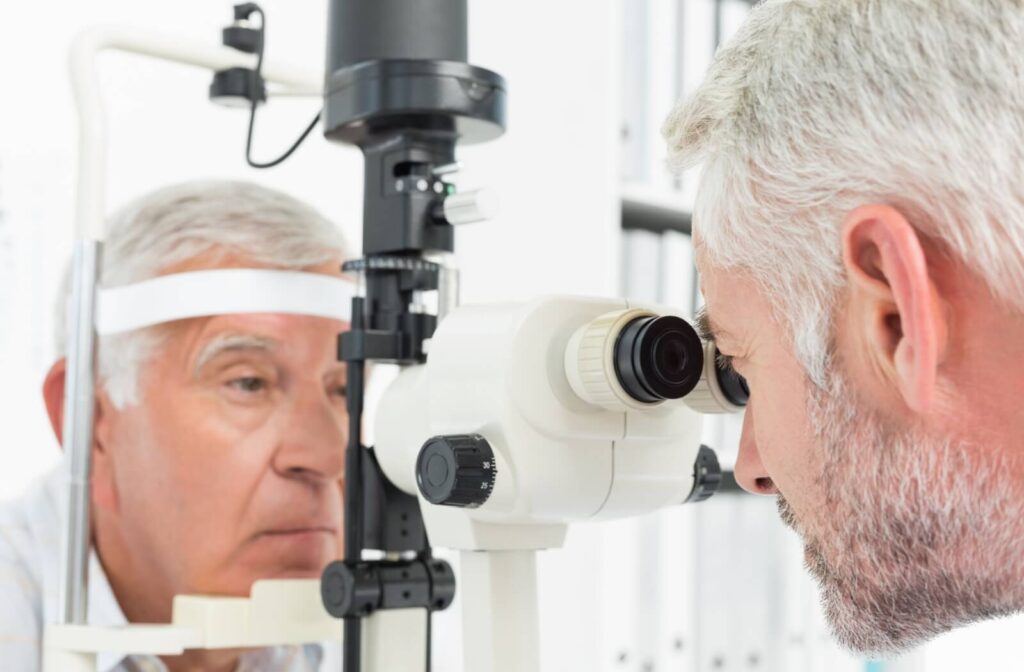Glaucoma is a progressive eye disease that affects millions of people worldwide, often leading to complete vision loss or blindness if left untreated. The disease can develop slowly and without early symptoms, so understanding its causes, risk factors, and prevention strategies is crucial.
Glaucoma can be hereditary. If a parent, sibling, or family member is diagnosed with glaucoma, you have a higher risk of developing it and should be proactive about your eye health.
Patients at risk for developing glaucoma should schedule a regular eye exam annually or more often if recommended by their eye doctor.
What Is Glaucoma?
Glaucoma is a group of eye diseases that damage the optic nerve, usually due to increased intraocular pressure (IOP). The optic nerve sends visual information from your eye to your brain.
Damage disrupts the optic nerves’ ability to send information, leading to vision loss—often without noticeable symptoms in the early stages.
Types of Glaucoma
There are several forms of glaucoma, but the most common types include:
- Primary open-angle glaucoma (POAG)
- The most prevalent form, POAG, occurs when fluid in the eye drains too slowly, causing increased pressure that gradually damages the optic nerve
- Angle-closure glaucoma
- Less common but more severe; this type happens when the iris blocks the drainage channels in the eye, leading to a sudden increase in pressure and potentially severe vision loss
- Normal-tension glaucoma
- Even when eye pressure remains within normal limits, the optic nerve can still suffer damage, possibly due to poor blood flow or fragile nerve structure
- Congenital glaucoma
- A rare form of glaucoma that affects infants, congenital glaucoma is typically inherited and results from an abnormal drainage system in the eye
- Pigmentary glaucoma
- Caused by pigment from the iris blocking the eye’s drainage system, this form of glaucoma can raise eye pressure and is more common in younger, nearsighted individuals.
Since glaucoma often develops slowly and painlessly, many people don’t realize they have it until permanent vision loss has occurred. This is why early detection and regular eye exams are essential—especially for those with a family history of the disease.
How Genetics Influence Glaucoma Risk
While anyone can develop glaucoma, genetics play a significant role in determining who is at higher risk. Research suggests that individuals with a first-degree relative (parent or sibling) with glaucoma are 4 to 9 times more likely to develop the disease.
Hereditary Factors by Glaucoma Type
While specific genes linked to glaucoma have been identified, researchers continue to study the complex genetic factors involved in the disease. Some known genetic associations include:
- Primary open-angle glaucoma has a strong genetic component, indicating that a family history significantly increases risk
- Angle-closure glaucoma is more prevalent among individuals of East Asian or Inuit descent
- Congenital glaucoma is often inherited and results from genetic mutations affecting the eye’s drainage system

Other Risk Factors to Consider
Although heredity is a significant risk factor, it’s not the only one:
- Individuals over age 60 are at a higher risk
- Ethnicities such as those of African, Hispanic, or East Asian descent have a higher likelihood of developing glaucoma
- Medical conditions like diabetes, high blood pressure, & heart disease can contribute to optic nerve damage
- Previous eye injuries or trauma may lead to secondary glaucoma
- Long-term use of corticosteroid medications or steroid eye drops can increase eye pressure, potentially resulting in glaucoma
Even if you don’t have a family history of glaucoma, being aware of these additional risk factors is essential for protecting your vision.
The Importance of Early Detection
Glaucoma is often referred to as the “silent thief of sight” because symptoms typically don’t appear until vision loss has already begun. Regular eye exams are essential to identify early signs, especially for high-risk patients.
Comprehensive eye exams can detect glaucoma in its earliest stages through:
- Intraocular pressure measurement to assess the pressure inside the eye
- Optic nerve evaluation to examine the nerve for signs of damage
- Visual field testing to identify any blind spots or vision loss
Since vision loss from glaucoma is irreversible, early detection is key to slowing or preventing progression.
Glaucoma Treatment Options
If detected early, glaucoma can often be effectively managed with treatments that help control intraocular pressure:
- Prescription eye drops reduce pressure by either decreasing fluid production or increasing drainage in the eye
- Laser therapy to improve fluid drainage & lower eye pressure.
- Surgery, used in advanced cases, can create new drainage channels to relieve pressure
- OCT is a quick, non-invasive scan that captures detailed images of your retina to help detect and monitor eye diseases like glaucoma and macular degeneration.
The appropriate treatment plan depends on the type and severity of glaucoma. It also requires regular monitoring by an eye care professional.
Steps You Can Take to Protect Your Vision
If you have a family history of glaucoma, taking proactive steps can help reduce your risk and detect the disease early:
- Schedule regular eye exams; if you have a genetic predisposition, annual comprehensive eye exams are recommended
- Monitor your intraocular pressure to help detect early changes
- Promote an overall healthy lifestyle, from a healthy diet to regular exercise
- Manage high blood pressure & diabetes to prevent eye health complications
- Avoid smoking & limit alcohol, as both can negatively impact optic nerve function
Being proactive about your eye health can make a significant difference in preventing or slowing glaucoma-related vision loss.
Early Diagnosis for Glaucoma is Key
Glaucoma can be hereditary, so work with your eye doctor to take preventive measures if you have a family history. Understanding your genetic risk, scheduling regular eye exams, and maintaining a healthy lifestyle can help protect your vision for the long term.
At Headwaters Optometry, we provide comprehensive glaucoma screenings and personalized treatment plans to help our patients safeguard their vision. Whether you have a family history of glaucoma or other risk factors, our team is here to help. Book an eye exam today.




